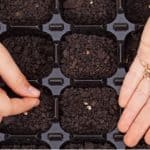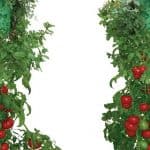Last updated on April 6th, 2022
Our site is reader supported, this means we may earn a small commission from Amazon and other affiliates when you buy through links on our site.
Compost will help the growing conditions for your plants, giving them a healthier, happier lifespan. But not all plants are the same. For example, compost for acid-loving plants such as Rhododendrons, Azaleas and Pieris needs ericaceous compost and this will differ from the compost most beneficial for plants that need neutral compost.
When picking the right compost, you should look for special compost for your particular plants if you want them to have the best growing conditions. Before you do this, get an at-home test kit for your soil, and test the pH balance in your soil so that you can determine whether or not to mix any lime soil improver into the compost. This is important because some plants like Rhododendrons or Azaleas love acidic soil, so you will need specific compost for them to be able to thrive.
No products found.
You cannot really hurt your plants by adding more compost, so if you invest in a specific amount and in the end you have some leftover, simply dig into the existing soil as an improver. After you have added your compost, water it thoroughly to remove any air pockets.
With the right compost, you can grow a range of vegetables and fruit even in the smallest of conditions because compost is greatly beneficial when it comes to pots or hanging baskets. Every year you should add fresh compost to increase the nutrients in the soil, and minimise pests and diseases.
And that’s not all you can do for your plants. After the compost is done away with, you can add decorative bark over the soil to suppress weeds and help with moisture retention.
Types of Compost
There are a few specific types of compost, and if your situation demands specificity, these are your options.
1. Peat based compost
A peat-based compost mix has a blend of peat, perlite or vermiculite, fertiliser, wetting agents, lime, and often sand or grit. The issue here is that the formulation for each of these items is contingent upon the manufacturer. You can, of course, make your own and have better control over this mixture, which is ideal for very specific demands.
2. Loam based compost
Loam-based compost has loam, grit or sand, and peat. There are a few variations here that have increasing amounts of plant foods integrated into them.
If you buy commercial compost of this variety you can find mixtures often sold as John Innes which have four different options, the first of which is seed compost with the smallest amount of nutrients meant for the development of new roots and germination. From there it increases in number from 1 to 3, indicative of the number of nutrients contained in the formula.
As a frame of reference the number one mixture has slightly more nutrients compared to the seed compost and is better for transplanting seedlings, number two is designed for potting small plants, and number three is meant for the final stage of planting or cropping with the highest amount of nutrients.
- For final potting of plants into pots or outdoor containers
- Traditional mixture of loam, peat and grit.
3. Peat free compost
Peat-free compost, as the name suggests, has no peat and the base is typically comprised of green compost, composted bark, or wood fibre. Their specialist ingredients are integrated depending on the intent of the compost which you will find in commercial products listed under the heading. You can also read the explanation of what is contained to determine if it’s suitable for your needs.
No products found.
4. Ericaceous compost
This is a mixture of compost that is highly acidic and designed specifically for acid-loving plants like Rhododendrons or Azaleas. You will need to be mindful about the type of plant you are growing because growing acid-loving plants without ericaceous compost can be detrimental to their overall health.
No products found.
5. Organic compost
Organic compost will contain a wide variety of things like expanded wood fibre, composted bark, and peat with naturally occurring nutrients taken from plants and animals to give your plants food for up to three months. You can find organic compost mixtures that are certified organic or you can make your own using a compost pile.
- The soil is enriched with micro-nutrients to boost plant health and development
- Peat free expands to a volume of 10 litres
- Perfect for smaller households with limited storage potting soil
- Ideal for both in-door and out-door use
- Enriched with plant food and nutrients
6. All/multi-purpose compost
Without the need for specificity, you can choose an all-purpose or multipurpose compost for your garden beds, borders, pots, hanging baskets, and containers. There are plenty of blended ingredients out there, some of which contain food specifically for plants up to 6 weeks old, others that contain food for plants up to six months old, and still others that will limit the amount of watering you are required to do by integrating absorbing material that stores and subsequently releases water as the plant continues to grow.
No products found.
Tips:
- Most plants that you purchase from any type of nursery or garden centre will already be planted in compost, so if you can, match the conditions in which your plant arrives to encourage better growth. And before you, transplant always tease the roots and add compost directly into the final resting home for your plants ahead of time.
- If you are germinating from seed you will need a specific seed compost with lower nutrient value and better water retention.
- If you are planting in a container always check for proper drainage. Depending on the material of the container you can drill extra holes or you can aid drainage by adding a layer of gravel or stones to the bottom.
- Compost needs to be used within one year of opening it, after which the nutrients diminish in their performance capacity so, as mentioned, once you plant all your ornamental plants, fruits and vegetables if you have any compost leftover just mix it somewhere else into the borders and beds and then cover it with bark.
- The reason you want to add compost, especially to pots rather than traditional garden soil is that garden soil often holds too much water and it lacks essential nutrients. As well as being very heavy, it often contains diseases and pests because it’s not sterilised and your plant growth will be severely diminished.
Last update on 2025-04-17 / Affiliate links / Images from Amazon Product Advertising API






